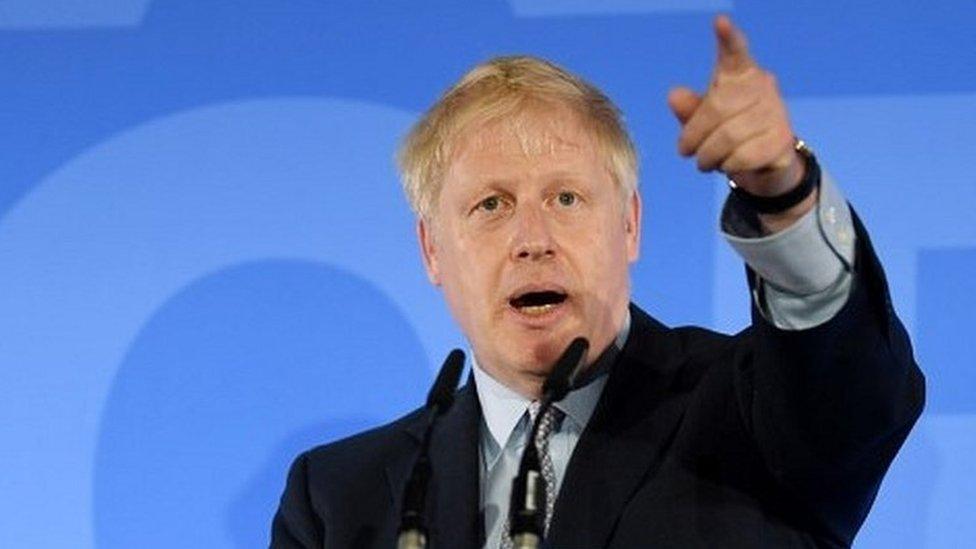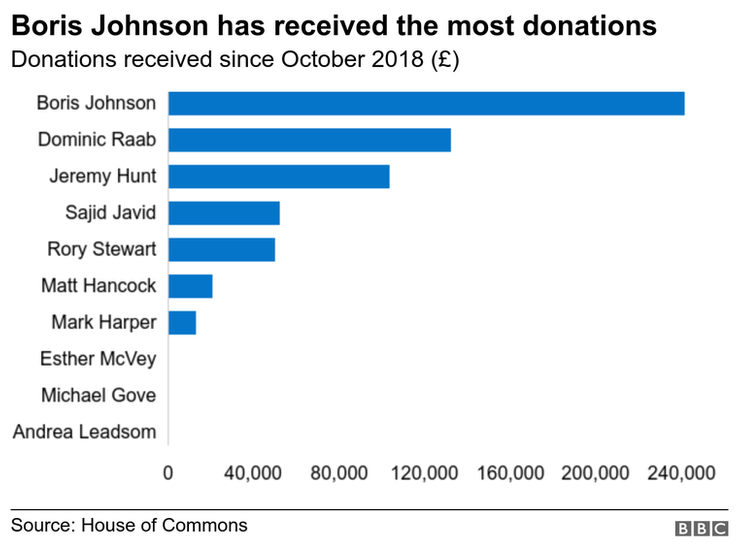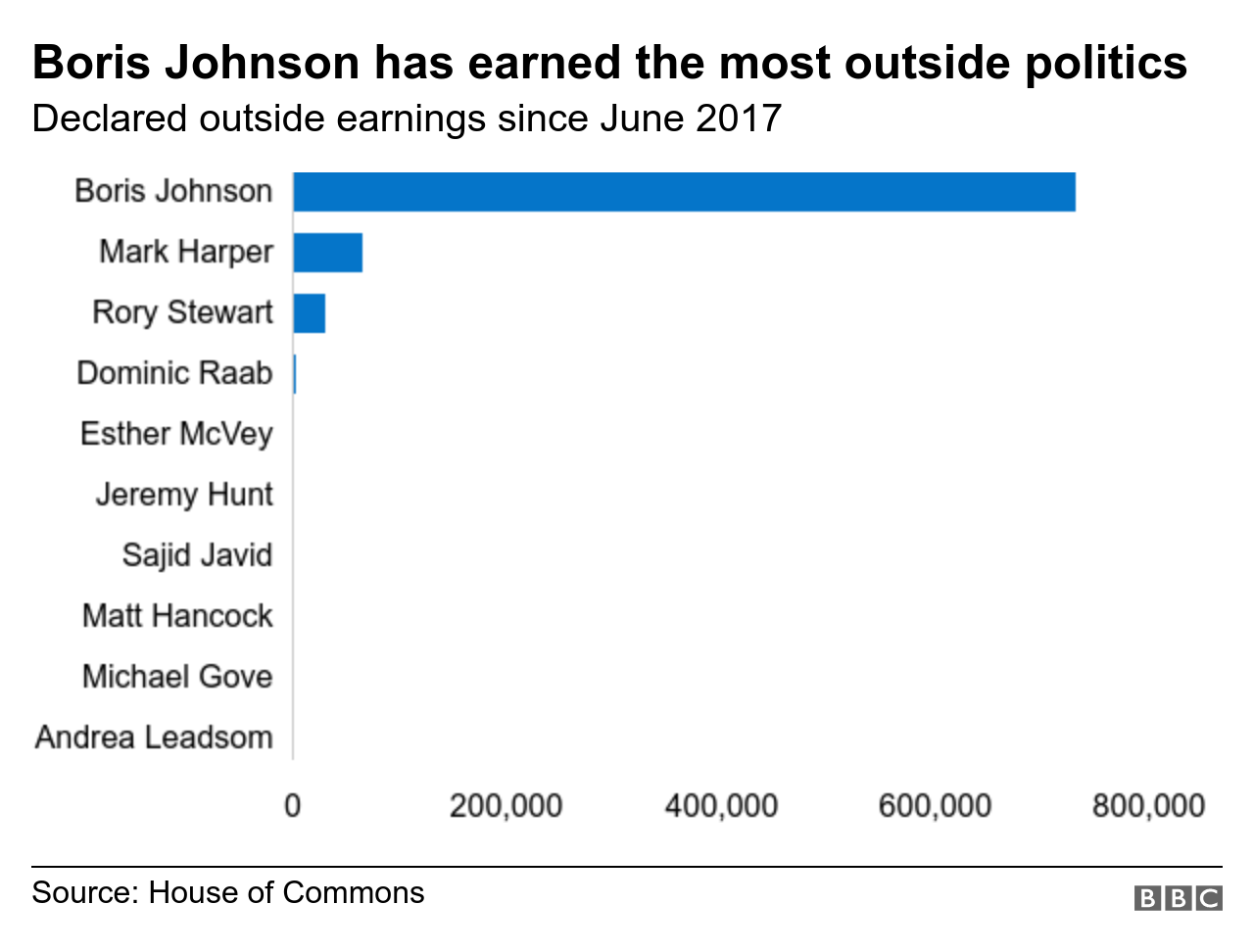Tory leadership race: Boris Johnson raises most donations
- Published

In recent weeks the candidates to become Conservative leader - and prime minister - have collected tens of thousands of pounds in campaign donations.
Parliament's register of interests shows that Boris Johnson has received far more than the others. The data also shows how much money MPs have earned on top of their £79,000 salary, and Mr Johnson is way ahead of his rivals on this as well.
What are the rules?
MPs must declare any money that someone might "reasonably consider to influence their actions or words as an MP"., external The amounts details of donors are published in the Register of Members' Financial Interests, external every two weeks.
What do we know?
Since the leadership campaign kicked off, the hopefuls have registered a flurry of direct donations.
The vast majority of this money is to fund leadership campaigns, though a small element of each total may be for a local party or other activities.

Mr Johnson is way out in front for these kinds of donations, raking in almost a quarter of a million pounds since October.
More than £50,000 of his donations this year has come from machine manufacturer JCB, as well as £20,000 from the company's chairman, Lord Bamford.
The biggest single donation to leadership candidates since the election was from Jonathan Wood - a hedge fund manager - who gave Mr Johnson £25,000 last month, and £50,000 for office and staffing costs last October.
Jeremy Hunt received £10,000 from Andrew Law, another hedge fund manager recently valued at £485m, who has given the Conservative Party more than £150m in the last four years.
The next day, Mr Law gave Sajid Javid £10,000.
Speeches and writing
The register of interests also gives information about money that MPs have earned on top of their basic salary.
Lots of parliamentarians make money from writing, making speeches at private events, or doing consultancy work for businesses.
BBC analysis of the register of interests since the 2017 general election shows that Mr Johnson has earned far more than anyone else.
Several candidates have had outside earnings of zero over the past two years because they have been ministers for all of this time.

Until recently Mark Harper, a trained accountant, was earning £3,000 per month for advising a law firm.
Rory Stewart earned money from book royalties and Dominic Raab from newspaper columns.
But nobody's earnings come anywhere close to Mr Johnson's - since resigning as foreign secretary in July 2018 he has received £23,000 per month for a weekly column in the Daily Telegraph newspaper, and £73,000 for books and articles.
His biggest source of income is eight speeches he has made at private events over the past few months.
Boris Johnson paid speeches since November 2018
India Today, New Delhi - £122,900
GoldenTree Asset Management, New York - £94,508
Pendulum Events & Training, Dublin - £51,250
Citigroup, London - £38,250 plus VAT
KNect 365, London - £28,900
British Insurance Brokers Organisation, London - £25,450 plus VAT and transport
Banque Pictet, Geneva - £25,298
Pomerantz LLP, New York - £21,250 plus VAT
What about ministers?
There are strict rules for ministers and outside employment - Mr Johnson's surge in extra earnings began when he left the Foreign Office last summer.
Michael Gove has been in the cabinet since the last election, so has had no outside earnings.
But during his time on the backbenches between July 2016 and June 2017, he made almost £150,000 on top of his MP salary, for work including speeches and a weekly column for the Times newspaper.
Cabinet ministers are entitled to more than £70,000 on top of their MP salary of £79,468.
How much can they spend?
According to a leaked document obtained by Sky News,, external the Conservative Party is imposing a spending limit of £150,000 during the campaign.
However, this only covers money spent since the campaign officially got under way on Friday.
Anything earlier than this, such as £56,000 spent on Facebook adverts last week by the Dominic Raab campaign, does not count.
In an election campaign there are legal limits on spending, monitored closely by the Electoral Commission, with expenditure published online.
In the Conservative leadership race, any limit is imposed by the party.